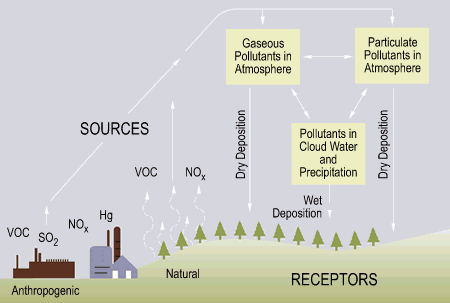Acid rain reductions means accepting trade-offs
Acid rain or deposition is caused by natural and man-made activities. Reducing pollution can improve the natural and man-made environment.
 Acid rain/deposition is caused primarily when fossil fuels are burned for energy. Two byproducts, sulfur dioxide (SO2) and nitrogen oxide (NOX), are released when coal, natural gas or oil is burned to produce electricity or cars are driven. This acid combines with precipitation as it moves through the atmosphere. What lands on the ground, buildings and trees is acid deposition or acid rain. Acid rain or deposition also can be caused by volcanoes or decaying vegetation.
Acid rain/deposition is caused primarily when fossil fuels are burned for energy. Two byproducts, sulfur dioxide (SO2) and nitrogen oxide (NOX), are released when coal, natural gas or oil is burned to produce electricity or cars are driven. This acid combines with precipitation as it moves through the atmosphere. What lands on the ground, buildings and trees is acid deposition or acid rain. Acid rain or deposition also can be caused by volcanoes or decaying vegetation.
Reducing SO2 and NOX emissions will reduce acid rain/deposition. There are several ways to achieve this. But each option has its own set of benefits and costs (Read related: Spring rains can bring more than May flowers).
Diagram at right: This diagram shows the sources of contaminants that resulting acid rain.
SO2 emissions can be reduced in power plants by switching to coal with lower sulfur content, washing the coal prior to burning it and installing “scrubbers” in the smokestack to chemically remove the SO2 before the gases are expelled into the air. All of these increase the cost of energy production.
Similar to scrubbers, catalytic converters have been installed on cars for 20 years to reduce NOX emissions.
Another option to reduce fossil fuel emissions is to adopt alternative energy sources. This includes hydropower, wind energy, geothermal, solar power and nuclear power. Currently, nuclear and hydropower are the most commonly used. These two, along with coal, are the cheapest types of energy. Wind, solar and geothermal energy are not economically competitive yet.
Batteries, natural gas and fuel cells are currently being used in cars but the cost is prohibitive to some populations.
Individually, everyone contributes to acid deposition when they turn on a light, change the thermostat or start the car. Collectively, people can have a big impact on reducing fossil fuel emissions by adopting ways to conserve energy:
- Reduce energy use by turning off appliances, computers and other electronic equipment and lights when not using them.
- Replace appliances when needed with energy-efficient models and follow manufacturer’s recommendations for use.
- Lower thermostat in the winter and raise the temperature during the summer.
- Keep all vehicles properly maintained to decrease NOX emissions. Walk, ride a bike and carpool whenever possible.
For additional information on acid deposition, see Michigan State University Extension article Spring Rains Can Bring More than May Flowers.
For more information on acid rain, visit Elmhurst College's acid rain page.



 Print
Print Email
Email




